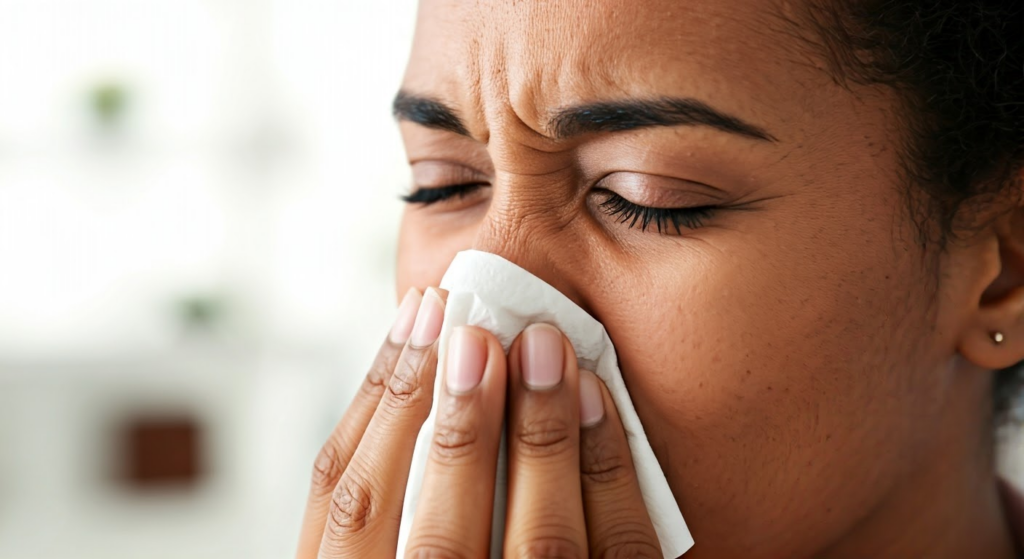Understanding Allergy Symptoms: Causes and Treatment

Key Highlights
- Allergies are an overreaction of the immune system to harmless substances called allergens.
- Common allergy symptoms include sneezing, runny nose, itchy eyes, skin rashes, and digestive problems.
- Severe allergic reactions can lead to anaphylaxis, a life-threatening condition.
- Identifying and avoiding triggers, such as pollen, dust mites, pet dander, and certain foods, is crucial in managing allergies.
- Treatment options include over-the-counter and prescription medications, as well as immunotherapy in some cases.
Introduction
Allergies are very common and impact millions of people in the United States. When we mention allergies, we mean how our immune system reacts to harmless things in our environment. These things are called allergens. They cause a series of immune system reactions in our bodies, which result in different allergy symptoms. These symptoms can show up in many ways and can be mild to severe.
Identifying Allergy Symptoms

Recognizing the signs of an allergy is very important for managing it well. Some allergy symptoms are mild and easy to handle. Others can be serious and need quick medical help.
Common allergy symptoms and food allergy symptoms usually affect the lungs, skin, and eyes. These include a runny nose, itchy and watery eyes, sneezing, coughing, skin rashes, and hives. Food allergies can also cause digestive problems like nausea, vomiting, diarrhea, and stomach cramps.
Common Symptoms of Allergies
The main signs of allergies often affect breathing. A runny nose and stuffy nose are common symptoms. A runny nose usually has a clear and watery discharge. This happens because the body wants to remove the allergens that irritate the nose.
People often have itchy and watery eyes too. Allergens can bother the conjunctiva. This is the thin layer that covers the eyelids and the white part of the eye. This irritation leads to discomfort.
Sneezing is another usual symptom. It is how the body tries to get rid of irritants from the nose. Sneezing can happen several times in a row. It can be quite strong, especially when a person is around many allergens.
Recognizing Anaphylaxis: Emergency Symptoms
It is important to know about severe allergic reactions, called anaphylaxis. While many allergy symptoms are mild, anaphylaxis is a serious medical emergency. It needs urgent care.
Symptoms of anaphylaxis can start quickly and may impact different parts of the body. Shortness of breath is a worrying sign. It happens when the airways get narrow due to the body reacting to an allergen. You might hear wheezing, a high-pitched sound when breathing, and feel tightness in your chest.
Other symptoms can be a sudden drop in blood pressure, dizziness, fainting, and swelling in the face, tongue, or throat. You may also notice a weak and fast pulse. If you think someone is having anaphylaxis, call emergency services right away. Use epinephrine if you have it.
Understanding the Causes of Allergies

Allergies are caused by a mix of factors. This includes our genes and things in our environment. For a person to have an allergic reaction, they first need to be sensitized to an allergen.
Sensitization occurs when the immune system thinks a harmless substance is dangerous. It then makes antibodies called immunoglobulin E (IgE). These antibodies attach to special cells called mast cells. When someone has an allergic reaction, mast cells release a chemical called histamine and other substances. When that person is exposed to the same allergen again, it binds to IgE on the mast cells. This causes the mast cells to release more chemicals, leading to allergy symptoms.
Environmental and Genetic Factors
Both environmental and genetic factors are important in how allergies develop. Environmental factors include things around us, like allergens, pollutants, and changes in the weather. These can trigger allergic reactions or help develop allergies in people who are sensitive to them.
Genetic factors are also key in deciding if someone is likely to have allergies. If a parent has allergies, their child is more likely to have them too. This comes from inheriting specific genes that affect how the immune system works with foreign substances.
The way environmental and genetic factors interact affects how the immune system responds to allergens. The inherited genes set the stage, while the environmental factors often act as the triggers, leading to the development of allergies in people.
Common Allergens: From Pollen to Pet Dander
Common allergens can be found all around us, both inside and outside. Pollen is a fine powder from trees, grasses, and weeds. It is a common outdoor allergen, especially during certain seasons.
Indoor allergens are also very common and can affect people with allergies all year long. Dust mites and spiders are tiny creatures that love warm and humid places. They are a big cause of indoor allergies. You can find dust mites in bedding, carpets, and sofas. This makes it tough for people who are allergic to dust mites to avoid them.
Pet dander and animal dander is another indoor allergen. It comes from small flakes of skin that animals, like cats and dogs, shed. These tiny bits can stay in the air and fall on surfaces. This can cause allergy symptoms for people who are sensitive to dander.
Types of Allergies
Allergic reactions can show up in different ways. This depends on the allergen and how it enters the body. Some allergies happen during specific seasons when certain allergens are around. Other allergies can happen all year because of constant exposure to indoor allergens.
Allergies can also be divided by how we are exposed to them. This can be through breathing, eating, or through the skin. It is important to know the different types of allergies. This knowledge helps in diagnosing and managing them effectively.
Seasonal vs. Perennial Allergies
Seasonal allergies, also known as hay fever, happen when pollen from trees, grasses, and weeds is released in certain seasons. Spring, summer, and fall usually have high pollen counts. This leads to more people suffering from allergic rhinitis symptoms, like a runny nose, sneezing, and itchy eyes.
On the other hand, perennial allergies last all year due to ongoing contact with indoor allergens. Common triggers for these allergies are dust mites, pet dander, cockroaches, mold, and some types of pollen.
People with perennial allergies may feel like they have a cold or a persistent cough that never goes away. Their symptoms can come and go, with changes in strength based on how much they are exposed to different allergens.
Food, Insect Sting, and Drug Allergies
Food allergies, insect stings, and drug allergies are among the most common types of allergies, often presenting with immediate and potentially severe reactions.
Food allergies occur when the immune system mistakenly identifies certain proteins in food as harmful invaders, triggering a cascade of reactions that lead to symptoms ranging from mild itching and hives to life-threatening anaphylaxis.
| Type of Allergy | Common Triggers | Symptoms |
| Food Allergies | Peanuts, tree nuts, milk, eggs, soy, wheat, shellfish | Hives, itching, swelling, vomiting, diarrhea, difficulty breathing |
| Insect Sting Allergies | Venom from bees, wasps, hornets, yellow jackets, fire ants | Pain, swelling, redness at sting site, hives, itching, wheezing, anaphylaxis |
| Drug Allergies | Antibiotics, aspirin, NSAIDs, insulin, chemotherapy drugs | Hives, itching, rash, swelling, wheezing, anaphylaxis |
Insect sting allergies are triggered by the venom injected into the skin by insects such as bees, wasps, and hornets. While most people experience localized pain and swelling, individuals with insect sting allergies can experience severe reactions. Drug allergies, often triggered by antibiotics, pain relievers, and other prescription medications, can manifest with various symptoms, including skin rashes, hives, and in severe cases, anaphylaxis.
Diagnosis of Allergies
Diagnosing allergies requires a careful process. It looks at medical history, symptoms, and allergy tests. Allergists are the doctors who specialize in recognizing and treating allergies.
They start by reviewing the patient’s medical history. They ask about symptoms, possible triggers, and if anyone in the family has allergies. This helps them choose the right allergy tests to find out what is causing the patient’s reactions.
Skin Tests and Blood Tests
Allergy tests are very helpful tools that find out what allergens cause an immune response in a person. The two main types of tests are skin prick tests and blood tests. Each one has its own benefits, depending on the patient’s needs and health history.
Skin prick tests, also called scratch tests, are popular because they are fast and easy. They can test for many allergens at once. In this test, a small amount of allergen extract is put on the skin, usually on the forearm or back. Then, the skin is pricked or scratched lightly so the allergen can enter the skin.
Blood tests check the level of allergen-specific IgE antibodies in the blood. A sample is taken and sent to a lab for examination. This test gives useful information about how the body reacts to specific allergens. Blood tests are especially helpful for people who cannot have skin prick tests. This may be due to skin issues, certain medications, or other reasons.
The Role of Allergy Testing in Diagnosis
Allergy testing is very important for finding out what causes allergies in people. It helps doctors identify the triggers behind their symptoms. This helps allergists create customized treatment plans and suggest ways to avoid allergens.
A key part of allergy testing is Immunoglobulin E (IgE). This is a type of antibody made by the immune system when it comes across allergens. High levels of IgE antibodies in the blood or a positive result from a skin prick test show that a person is sensitive to a specific allergen.
Allergists look at the results of allergy tests along with the person’s medical history, symptoms, and possible exposure to allergens. This complete method helps ensure an accurate diagnosis and helps create personal management plans.
Effective Treatment Strategies for Allergies

Effective allergy treatment works best when it uses different methods. It needs to focus on the immune system response and how to manage allergy symptoms. Finding and staying away from allergens is very important. However, avoiding them all the time can be hard.
There are medications, like over-the-counter antihistamines, asthma medicines, and nasal corticosteroids, as well as stronger prescription options. These medicines help reduce allergy symptoms by blocking histamine and lowering inflammation. Sometimes, allergists suggest immunotherapy. This longer-term treatment works to make the immune system less sensitive to certain allergens.
Medications Used in Treating Allergies
Antihistamines come in pills and creams. Doctors often suggest them to help with symptoms like sneezing, a runny nose, itchy eyes, and skin rashes. These medications block histamine, which is a chemical released by the immune system during an allergic reaction.
For people who have severe allergic reactions, epinephrine auto-injectors are very important. You may know them by names like EpiPen or Auvi-Q. Epinephrine is a hormone that quickly stops anaphylaxis. It does this by squeezing blood vessels, relaxing the muscles in the airways, and raising the heart rate.
People at risk for anaphylaxis should always have two epinephrine auto-injectors nearby. They should also wear a medical alert bracelet to inform others about their allergy during emergencies.
Immunotherapy and Natural Remedies
Immunotherapy, often called allergy shots, is a long-term treatment. It changes how the immune system reacts to certain allergens. During this treatment, a person gets regular injections with slowly increasing amounts of the allergen extract. This process usually takes several months to years. The aim of immunotherapy is to help the immune system become less sensitive to allergens. Over time, this can reduce or even stop allergic reactions.
While medicines and immunotherapy are common ways to treat allergies, natural remedies can also help manage symptoms. Saline nasal rinses can clear out allergens and mucus from the nose, helping to relieve congestion.
Eating foods that have anti-inflammatory benefits, like omega-3 fatty acids in fish oil and antioxidants in fruits and vegetables, may reduce the immune system’s reaction to allergens. This can also improve overall well-being.
Conclusion
In conclusion, knowing the signs of allergies can help you spot and handle allergic reactions better. Common triggers include pollen, and serious events like anaphylaxis are important to know about. Being aware of these things is key to managing allergies. By catching symptoms early and getting the right diagnosis and treatment, you can deal with allergies more effectively and improve your life. Stay informed, talk to healthcare experts, and take steps to manage your allergies for a better and happier life.
Schedule a consultation with an allergist for personalized guidance on managing your allergies.
Frequently Asked Questions
What are the first signs of an allergic reaction?
The first signs of an allergic reaction can look different for everyone. Common signs and symptoms of an allergic reaction include hives, which are itchy bumps on the skin. You might also experience itching, mainly where your skin touched the allergen. A rash can occur too, showing up as red skin, small bumps, or blisters. Swelling is another sign, often happening in the face, lips, tongue, or throat.
Can allergies develop later in life?
Yes, you can get allergies as an adult, even if you have never had them before. Adult-onset allergies can happen for many reasons. These reasons include being around new allergens, changes in hormones, and changes in your environment.
Are allergies hereditary?
Yes, allergies can run in families. If someone in your family has allergies, you may be more likely to get them too. This is because of genetic factors that affect how your immune system reacts to allergens. Allergies are often passed from parents to children.
How can I differentiate between a cold and an allergy?
It can be hard to tell the difference between a cold and allergies because they share some symptoms. A cold usually lasts about a week or 10 days. On the other hand, allergy symptoms stay until you are around the allergen. The mucus from a cold is often thick and discolored. In contrast, mucus from allergies is usually clear and watery. You often get a fever with a cold, but it is rare with allergies.
https://order.store.mayoclinic.com/flex/mmv/fhblc01
